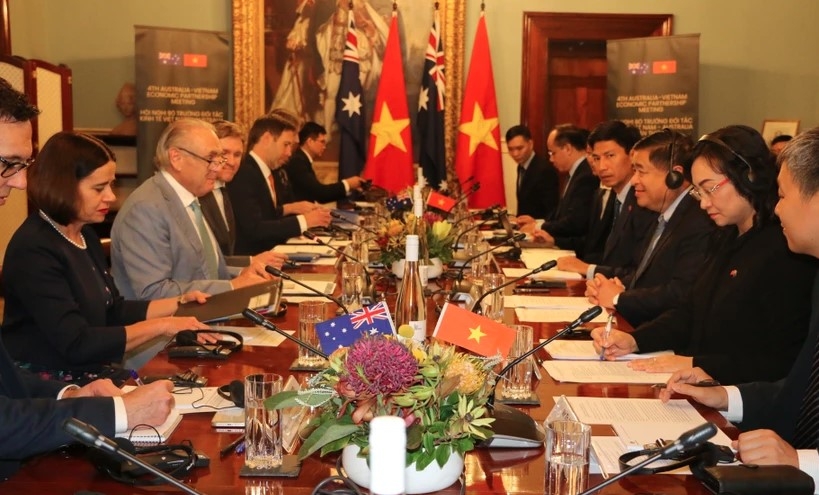The meeting was held in the context that both nations upgraded their relationship to a Comprehensive strategic partnership during Prime Minister Pham Minh Chinh's official visit to Australia in March.
In his address, Dung said that with the upgrade of the relationship, Vietnam and Australia have become key economic partners of each other across multiple fields, including trade, investment, development cooperation, agriculture, education and training.
Farrell held that bilateral trade is booming, creating more opportunities for exporters, businesses, and workers of both countries. Over the past three years, bilateral trade has hit a record high of AUD26 billion and Vietnam has become one of the fastest growing sources of international visitors to Australia after the COVID-19 pandemic.
Australia's Southeast Asia Economic Strategy is supporting its businesses in seizing new opportunities in the region, with Vietnam defined as one of the countries offering huge potential for Australian exporters, he emphasized.
With regard to official development assistance (ODA), Australia is one of the largest providers of ODA for Vietnam. According to the Australian Embassy in Vietnam, in the 2023-2024 period, Australia has provided AUD95 million in ODA to Vietnam, primarily in such areas as economic growth, skilled workforce development, energy and climate, and gender equality.

Concerning foreign direct investment (FDI), as of August 2024, Australian investors had run 660 valid projects with total registered capital of US$2.05 billion, making it rank 21st out of 149 countries and territories pouring capital into Vietnam.
The past nine months saw two-way trade reach US$10.8 billion, up 5.6% year-on-year, of which US$5 billion came from Vietnam’s exports, up 30.3% year-on-year, and the remaining from its imports, down 9.3% on-year.
At the meeting, the two sides discussed a host of measures to strongly promote bilateral economic relations and outline new directions. They also assessed the implementation of the Enhanced Economic Engagement Strategy (EEES) and the results of the meetings of the Working Groups on ODA, FDI, and trade.
Both sides also deliberated discussed cooperation at multilateral and regional forums and mechanisms, such as the Association of Southeast Asian Nations (ASEAN), the Asia-Pacific Economic Cooperation (APEC), the World Trade Organisation (WTO), the Regional Comprehensive Economic Partnership (RCEP), the Comprehensive and Progressive Agreement for Trans-Pacific Partnership (CPTPP), and the ASEAN-Australia-New Zealand Free Trade Area (AANZFTA), as well as the Indo-Pacific Economic Framework for Prosperity (IPEF).
They also agreed that the fifth meeting will be held in Vietnam at an appropriate time to review the implementation progress of the EEES, as well as agreements reached in the previous meeting, and propose new initiatives and cooperation agreements.


